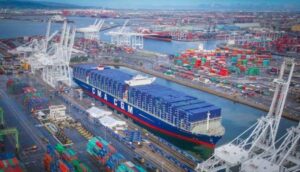The major ports in Nigeria have always been: Lagos Port Complex and Tin Can Island Port Complex both in Lagos State, the Calabar Port Complex in Cross River State, the Delta Ports in Warri, Delta State and the Rivers Port Complex and the Onne Port Complex, both in Rivers State.
Before the idea of the Lekki Deep Seaport, which has now officially opened for business, Apapa port had always enjoyed the glory of being the biggest port in Nigeria.
But the expansive and more modern Lekki Deep Seaport has taken that glory. This is going by the facility it promises to offer, and the size of the port.
Lekki is the first deep sea port in Nigeria. It is expected to become a major cargo hub for West Africa. In addition to being the country’s first fully automated port and it is largest, it represents the first expansion of the country’s ports in 25 years and is part of an ambitious plan of development for the region.
Located approximately 40 kilometers to the east of Lagos, the port covers over 90 hectares. The project was built by the China Harbor Engineering Company as part of China’s Belt and Road strategy. The Chinese company officially handed the port over to Nigeria after completing construction but retains part ownership in the port’s operating company.
Coming after so much efforts about the quest for hub status in West Africa, the final ‘berthing’ of Lekki port is a boost for Nigeria.
We recall that, as far back as the 1990s, West African countries have been racing against one another to emerge as the shipping hub. At a time, it was between Nigeria and Cote d’Ivoire. Along the line, Cotonou port in Benin became the transshipment point for some cargoes destined for Nigeria.
No doubt, Lekki is one of Africa’s top six ports, and its owners expect that its modernity and efficiency will make Nigeria a regional hub. It is also Nigeria’s largest and first fully-automated port. It has more than doubled the capacity of Lagos’ ports, which had remained the same for about 25 years.
The new port is expected to accommodate the world’s largest cargo ships, this is in addition to reducing cargo dwell time from over 30 days to two days.
Yes, the story of Lekki port is inspiring; yet, a combination of factors will determine its success. These include its capacity to meet the demands of shipping; its efficiency and competitiveness in the national and international contexts; the coordination of policies; the way transport modes work together; the state of the inland economies; and the application of technology.
Perhaps, the greatest challenge the port is going to have may be evacuation of cargoes. So far, it is very obvious that its promoters paid little attention to the challenge logistics in their planning.
For now, there is no provision for rail connection to the expansive port. In addition to this huge deficit, we dare add that the road infrastructure is inadequate for the anticipated volume of traffic.
We agree with those who have expressed fears about the sanctity of the economic projections which informed the vehicle company and the public-private sector partnership (PPP) which berthed the port.
The three known investors are: China Harbour Engineering Company Ltd, Singapore’s Tolaram Group and the Nigerian government (specifically, the Nigerian Ports Authority and the Lagos state government.
The above school of thought feels that the PPP arrangement has the potential drawback of idle capacity, if the economic prospects that motivated birth of the port fail to materialise. Then the huge investment in the deep sea port project would become a huge burden of unpaid debts.
Aside from the numerous boost to the Nigerian economy, perhaps, the greatest fear currently being expressed is that of the impending traffic gridlock that the Lekki port will foist on all those who either live in that axis or have to drive through or even work there.
A foretaste of what is to happen was given sometime in 2022, by a body known as the Nigeria Economic Zones Association, which expressed concern over the increased movement of oil tankers in the Lekki axis of Lagos State. This was after an oil and gas firm commenced operations there and the looming chaos became apparent.
According to the association, the Free Trade Zone where the Lekki port and other high networth businesses are coming up, has no truck and tanker parks. To the best of our knowledge, the Lekki Deep Seaport does not have a truck transit park yet, even though we are told that a truck park is being constructed.
According to the Nigeria Economic Zones Association, “this situation, if not tackled early enough, will render the whole axis not conducive for businesses, and this will negatively affect the country’s drive for economic development through the Free Trade Zone scheme.”
Just as stated above, there is yet no rail link; which means that, all cargoes will be evacuated by road. Our worry about traffic in and around Lekki once the port becomes operational is informed by what is presently happening in Apapa on account of the trucks that come to either load cargoes or to drop empty containers for export.
Another major challenge ahead of the imminent take-off of the port, is the access road. The long stretch of road leading to the port is far from being completed.
So we ask: How smooth will Lekki port operations be, when the road leading to the facility is far from being completed, and there is no truck park.
shippingposition
Kindly like us on Facebook/twitter















